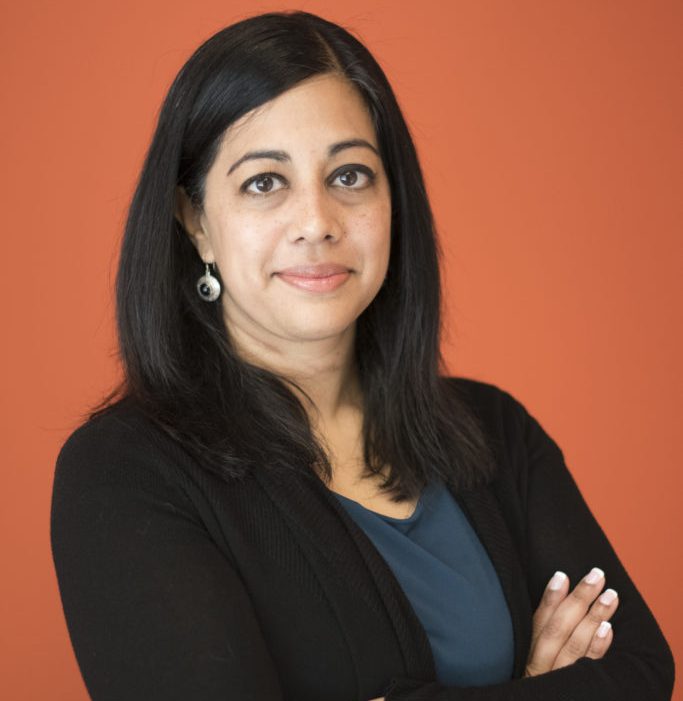On June 14, 2017, The Globe and Mail published an interview with the YWCA’s Maya Roy. She spoke about the ongoing fight to end violence against women, and her insight into the different circumstances of racialized and marginalized women.
She also spoke about her own experience of violence and how Wen-Do saved her life. Read on or visit the original article on The Globe and Mail.
YWCA head Maya Roy on the ‘necessary conversations’ to stop gendered violence
By Elizabeth Renzetti
Maya Roy, 37, is the new head of the YWCA, the largest women’s service organization in Canada. The 147-year-old charity works toward improving women’s lives through its 32 member agencies across the country, campaigning for an end to gendered violence, and supporting women – often those who are most marginalized – in job training, housing and education. Roy trained as a social worker and was most recently the head of Newcomer Women’s Services Toronto.
There has been a lot of talk over the past couple of years in this country that we are finally having “necessary conversations” around violence toward women. Do you see those conversations manifesting in real change?
Yes, because I’ve seen the shift. Even with The Globe and Mail’s Unfounded series: I’ve been doing this for 20 years now, and I can tell you that, especially as racialized women, Indigenous and trans women, we are Unfounded every day.
How so?
I’ll give you an example. A couple of years ago, a newcomer woman from Afghanistan was a volunteer with our program. A man claiming to be her brother had shown up to pick her up after our drop-in program. A couple of days later, she came in and showed me the bruises on her arms. He had tried to abduct her outside her English class that morning. I called the police four times in seven hours to make a report. They didn’t come.
Seven months later, I got a visit from a York Region police detective. The man had sexually assaulted, and videotaped the assaults, of 11 women, all newcomers in his community. At the trial, they subpoenaed my calls. The whole notion of Unfounded, I’ve seen that over the past 20 years. But the rules of the game have changed. We’re not going to ask for permission for equity. We’re going to hold institutions accountable.
You talk about how important it is for feminism to have an intersectional lens. How will that inform the work you’re doing here?
Like a lot of us, I’ve been living that intersectional piece every day, being both brown and a woman, and at one point young – though not any more! But I also can’t stop learning and growing. For example, doing work in the settlement community around ensuring that trans and queer-identified voices are heard. If we’re not doing something correctly, trans community members will tell us, and we would need to make those changes. This young generation is not interested in asking permission, and that’s okay.
I learned a lot from Black Lives Matter Toronto. They were holding rallies after Andrew Loku was shot [by Toronto police in 2015]. That’s transitional housing for people with mental-health issues. He was holding a hammer. As social workers, we didn’t do a good job as a sector in responding. It wasn’t until Black Lives Matter began raising those issues and having a march that we started to pay attention. As a society, we failed someone who was among the most marginalized. It taught me where things were missing in my own work.
Are you taking the YWCA in a more political direction?
No, it’s about being responsive to community needs. I’m interested in getting things done. It can be anything from whether an ESL school expands, or someone gets a job, or if certain policies are changed for undocumented newcomers. I come from a time where, if you were getting funded as a settlement agency, there was such an advocacy chill that even talking about refugee rights was a problem. When doctors and nurses were protesting health cuts [to refugees], I was literally standing behind them, hiding. Then all of a sudden everything changed.
What do you think are the biggest misperceptions about gendered violence?
That the work is over. That because it’s illegal we don’t need to talk about it any more.
Where is the demand increasing for your services?
Housing. Whether it’s affordable rent, or needing second-stage housing for women leaving abusive relationships. I just got back from Iqaluit, and rents there are as problematic as they are in Toronto. Women are choosing to stay in abusive relationships, because where would they go? In a wealthy country like ours, that’s really problematic.
You were the victim of an attack in 2002 [Roy had her throat cut by an assailant while working in Thailand]. How did that affect the kind of work you wanted to do?
Thank God, I had done a Wen Do women’s self-defence workshop two weeks before. If it wasn’t for that, I would be dead. Someone decided to climb a 12-foot-high fence. It was in the media, it was a really big deal in Thailand.
It made me think about and understand trauma, coming from a place of lived experience. I do work with young people who are street involved or gang involved, and when they see the scar they know this is not just something I read about in books.
This conversation has been condensed and edited.
https://www.theglobeandmail.com/life/ywca-head-maya-roy-on-the-necessary-conversations-to-stop-gendered-violence/article35311336/

